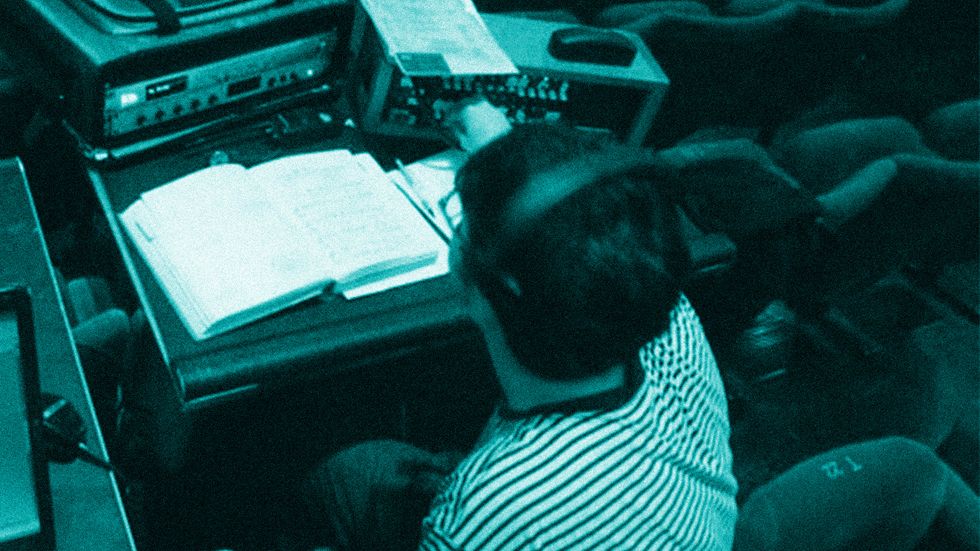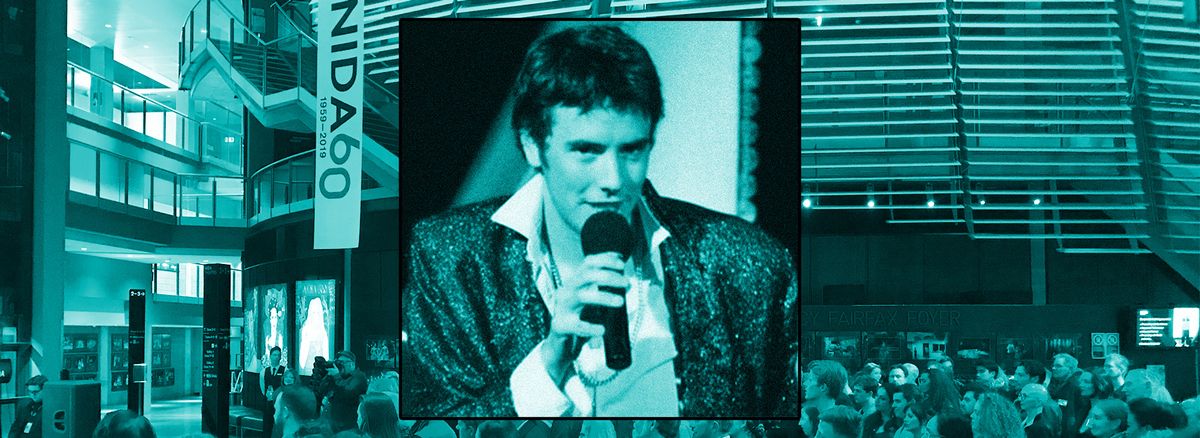Click through to Best of 2019 to discover the Newsworthy articles with greatest impact: whether by highest page views, social media engagement or winning national awards.
- Winner of the 2019 Ossie Award for student journalism for best text-based story by a postgraduate student (over 750 words).
COMMENT
"Fellow survivors," Di Smith, actor and former student (Class of '78), begins her address to a foyer full of alumni. "I'm the same age as NIDA, but clearly I haven't had as much structural work done."
Her broad yet eloquent accent projects out from a bloom of red curly hair. I squint at her from the back of the room, perhaps recognising her from an episode of Rake I watched recently.
"Every single one of you will have vivid memories of your time here at NIDA. And not all of it will be rosy, I'm sure. It's kind of like, if you think of your life as a Disney movie, right? — and let's face it, who doesn't think of their life as a Disney movie — NIDA takes the role of the stepmother figure. Incredibly influential in your life.
"You know, she takes that pride of place on your professional bio, but you're well aware that at any moment she could deliver you a swift kick up the arse."
There's a willingness from students to shut out their real lives and become part of the cult of NIDA.
I scan the crowd. How did such an odd assortment of people come to be in the same room at the same time? The National Institute of Dramatic Art (NIDA) is Australia's most reputable provider of tertiary education specialising in the performing arts. Anywhere between 1100-1800 hopeful young people audition for a place each year, but it gives away scarcely 100 places across all its full-time courses. NIDA is ranked in the top 10 drama schools in the world and is the only one in the top 10 not based in the US or UK.
In the year I applied, entry was by audition for the actors and interview for the production courses. They didn't care what score you got at high school or how well you did at maths. They didn't even care if you passed drama in Year 12. You had to prove yourself on the day, regardless of background or academic standing.
It takes a certain type of person to cut it at NIDA:- a NIDA student is always punctual (if you turned up late three times, you could be kicked out). This is not only a reflection on the punctuality expected in the industry but a constant reminder of the privilege of this level of education;
- a NIDA student believes in equality;
- a NIDA student is open to new ideas;
- a NIDA student can take direction and be part of a team;
- a NIDA student is committed to working hard enough to sustain a career in the rough-
- and, if you're lucky, maybe, a NIDA student is talented as well.
These are the student qualities spoken of out loud. There were a number of unspoken similarities in the people allowed through the doors. While I was there from 2004-2006, I noticed a widespread fondness for caffeine and alcohol abuse that was celebrated and boasted of. There were a disproportionately large number of people with dyslexia.
Most of all, there was a willingness from students to shut out their real lives and become part of the cult of NIDA. Forget old friends and families; you're a NIDA student now. While I was there, I had a combination of compulsory classes and practical work from 9am-11pm, six days a week. To top it off, I worked there on Sundays to pay my rent. There's no time to think about the real world. You put blinkers on and dived in, leaving anything that wasn't NIDA behind you.
****
DI SMITH appears to take joie de vivre to a new level as she sings out above the crowd. Perhaps it's real, but she is a skilled and experienced actor, so who knows what she's actually feeling inside.
"Now that you no longer live under her roof, [NIDA] insists you come for Christmas and Birthdays," she says. "And here you are at the 60th birthday.
"You gird up your list of career failures and you gather that little handful of successes to cover the top with them so that no one will notice the stuff underneath. And you take a very deep breath as you walk in the door. Just in case there's that little peccadillo you had when you were 21 that you'd completely forgotten about. Anybody?
"And then, as in any family event, you just get swept up in the sheer joy of being faced with what's inside. Beautiful friendships. Old adversaries, and even older jokes."
*****
IT'S ALWAYS a conflict for me when I walk back through the doors of NIDA. While you're a student here, it feels like you own the place. You know the corridors better than you know your childhood home. No one gets through NIDA without crying at least once. Everyone breaks down. Most build themselves back up. For three years NIDA is your iron lung and then it spits you out into the world as a completely different being.
To go back in is to face all those memories again. There's that girl I had a crush on and that tutor that screamed at me. There's that wall I nearly fell off and that ceiling I painted. There's that doorway where I accidentally dropped and smashed a widescreen tube television, and the staircase I was sitting on when I thought I was ready to quit and give up.
For every one Hugo Weaving, there are probably 40 NIDA graduates still breaking their backs to keep the performing arts afloat in this country.
The history of NIDA stretches back much further than my three years there. It's become a national treasure. It's one of the few performing arts institutions funded in Australia by the Federal Government, along with NICA and Flying Fruit Fly Circus (circus schools), the ABS (ballet), NAISDA (indigenous), AFTRS (film), ANAM and AYO (music).
The list of NIDA alumni boasts Cate Blanchett, Toni Collette, Mel Gibson, Baz Luhrmann, Garry McDonald, Hugo Weaving, Sam Worthington, Catherine Martin and Jim Sharman, to name but a few.
"Sixty years ago, we began in a tin shed across the road, with 23 students," says NIDA CEO Jennifer Bott. "From those early days, we grew up, not without the odd teething difficulty and tantrum, as you would expect, but always with our eye on the prize — which is to fulfil our mission of creating extraordinary opportunities for talented students to learn from great teachers, and to develop the performing arts in Australia, though Australian stories and Australian voices."
As well as the coveted acting course, there are costume production and technical production courses. I was a technical production student and my first job out of NIDA was at the Sydney Opera House. Eventually, I ended up working at The Royal Opera House, Covent Garden, in London. Even at Covent Garden I wasn't safe, there were at least two other NIDA alumni in the team. Even if we were strangers at first sight, within five minutes, we were close acquaintances with a shared knowledge of each other's history and experiences. We could laugh together about the narcoleptic script analysis teacher who would nod off mid-class, or the "fascinating glue talk" the head of props gave to all the first year students during orientation.

Then you compare scars, mostly internal but not always. There is a sense that if you've gone through NIDA, you've done the hard yards. Do these hard yards set you up for a life of Hollywood red carpets and hors d'oeuvres on a yacht with Georgio Armani?
"I'm a designer, I have no money," says a short young guy with bright eyes and a casually affected level of chic-scruffiness hanging off his corduroy trousers. "I don't have time for holidays. I have a three-month break coming up. Turned down a show. I took a look at it and thought about it, but I didn't want to do an indie show on an indie budget with an indie contract." He squeezes his champagne glass. There's dark paint caking in the creases of the knuckles on his left hand. "I was about to crack. I could feel it coming on. It's happened before. So, I'm just having some time off, sitting around Sydney." He's cut off by an approaching acquaintance and he trails off into the gently rumbling crowd, clinking glasses with some old classmates.
For every one Hugo Weaving, there are probably 40 NIDA graduates still breaking their backs to keep the performing arts afloat in this country. They're workhorses, and workhorses have a shorter lifespan than the show ponies and a much greater burden.
I lost my youth to NIDA. Lost it, in the same way that one "loses" their virginity. It's not necessarily a bad thing to lose and it can be fun, exciting and terrifying all at once. You fumble your way through it, making it up as you go, using what you have heard to try to navigate through until the end. There's no getting it back though and it forms a lifelong bond to those who went through it all with you.
I'm not the feisty, irresponsible teenager that arrived at NIDA in 2004 anymore - that's me, Alex Dick, pictured above on stage at NIDA's Parade Playhouse during Orientation Week 2005. In 2019, after years pigeon-holed as a stage manager, I've refocused my career in media, I'm in the process of taking my wife's surname Houy and each year, I seem to lose touch with another member of my NIDA cohort. And yet. There remains an unbreakable connection to every single person who has battled through NIDA over the past 60 years and that will stay with me for life.
At the front, Di Smith is still projecting out to the room, preparing everyone for a toast. Her red, curly mane thrashes with glee as she wields a glass of sparkling wine. She feels that connection too.
"I was thinking about the invisible titanium thread that binds you to your cohort, it's that lifelong bond, that intense shared experience where your creative soul is formed. It's palpable and it's rare."
In this, she's right.






